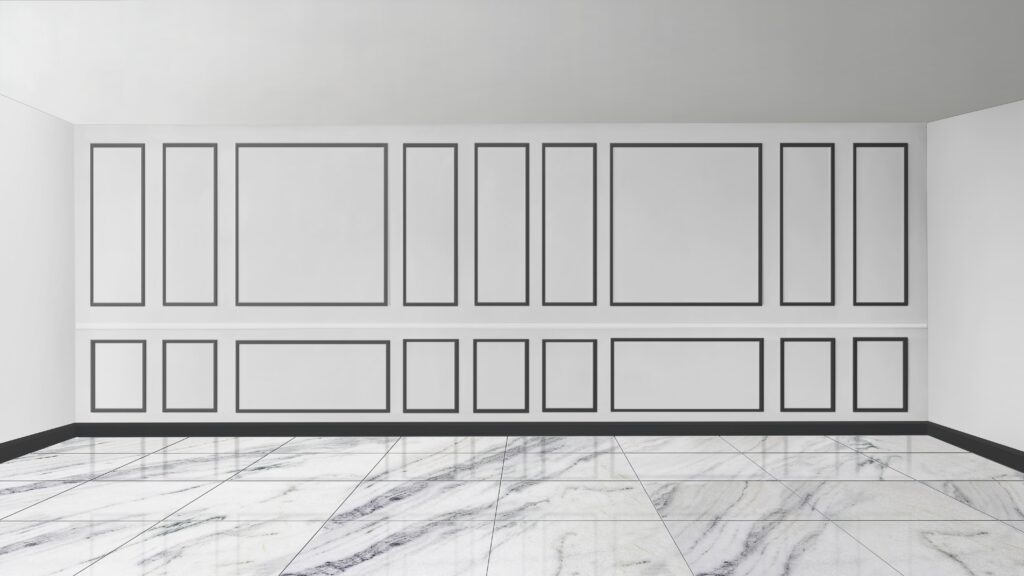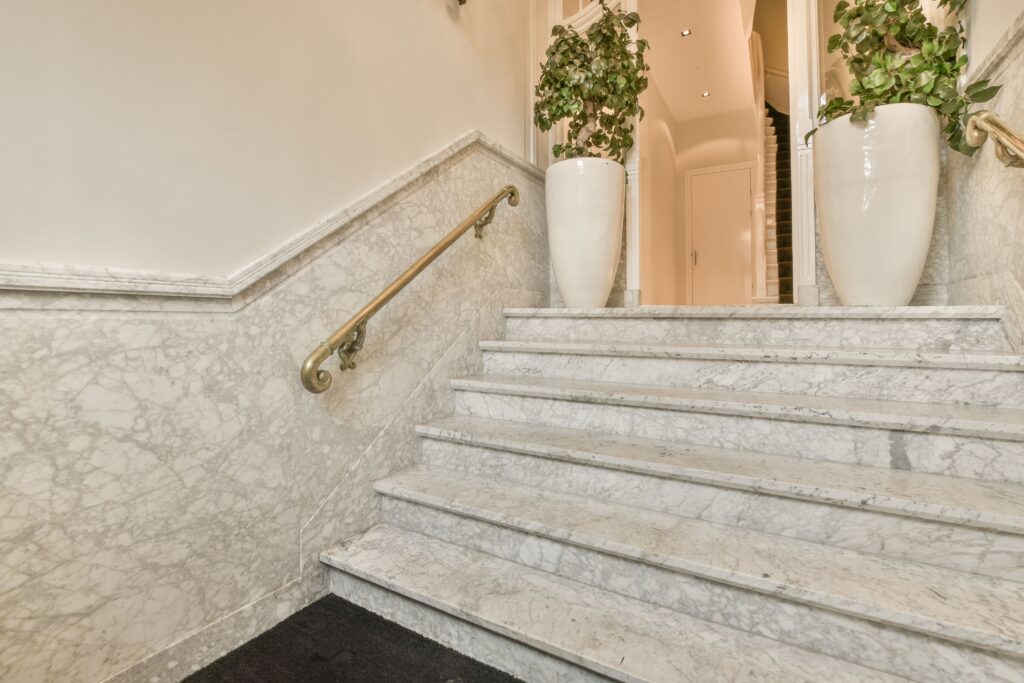Marble flooring is a type of flooring material that is made from natural stone called marble. Marble is a metamorphic rock that is composed of recrystallized carbonate minerals, most commonly calcite or dolomite. It is prized for its beauty, durability, and versatility, and has been used for thousands of years in various forms of architecture and art.
Marble flooring typically consists of large, smooth slabs of marble that are installed over a subfloor. The slabs are often polished to a high sheen to bring out the natural beauty of the stone, and may be cut into various shapes and sizes to create intricate patterns or designs. Marble flooring is known for its coolness, which makes it a popular choice in warmer climates, and it is also relatively easy to clean and maintain.
1. Is marble flooring expensive?
Yes, marble is one of the most expensive flooring materials in market
2. Is marble flooring a good choice for flooring?
Yes, flooring is a good choice because of its durability and stylishness. It’s renowned for its royal appearance and superiority over other floorings.
3. How much does it cost to lay marble flooring?
The average cost to lay marble flooring is $5 to $10 per square foot
4. Which marble is best for flooring?
Carrara marble is best for flooring because it is more economical than other marble types and for its greyish-white appearance. It is the widely used marble type for flooring.
5. What are the pros of marble flooring?
Marble floors improve the aesthetics of your interiors.
It is more durable than other flooring materials.
It is scratch resistant too.
6. What are the cons of marble flooring?
Marble flooring needs proper maintenance and care.
Italian marbles are prone to crack due to their soft texture.
Marble is heavy and needs more labour to shift it from one place to another.
It becomes too cold during winter.
7. Does the marble floor crack easily?
No, the marble floor doesn’t crack because it’s more durable, but sometimes if you use low-quality marble, then it may break.
8. Is marble better than tiles?
Tiles are better than marble because it’s easy to clean, affordable, and suitable for all climates.
9. How do you maintain the marble floor?
Use a soft cloth or mop to clean the marble floors. Also, use mild cleaning products to increase the durability of your marble floors.
10. What is the lifetime of marble floors?
Marble floors can last a lifetime, but the average life span is 25 years.

11. Can I use a vacuum cleaner on the marble floor?
Never use a vacuum cleaner on the marble floor because it can damage your floors severely.
12. Which colour marble is best for flooring?
The top 5 colors widely used for marble flooring are white marble, green marble, golden marble, pink marble, and brown marble. Choose the best one based on your needs.
13. Is marble flooring suitable for the living room?
Marble flooring is suitable for the living room because of its unbeatable elegance, durability, style, and versatility.
14. Which size marble is best for flooring?
The best size for marble flooring is 12 inches in length and 3/8 thickness.
15. Is marble tile hard to maintain?
Marble tiles are naturally colored, and it has a unique look. Hence, it requires high maintenance and must be regularly sealed and cleaned.
16. Which is more costly, tile or marble?
Yes, marble is more costly than tiles.
17. Which floor is best for a house?
Marble floor is best for house flooring because of its unique appearance and wide range of designs and colours than other flooring materials.
18. Is granite better than marble?
Yes, granite is better than marble because it’s more brutal and vital to withstand durability.
19. Does marble last longer than other floors?
Yes, marble lasts longer than other flooring materials.
20. Can you put hot pans on marble?
Yes, you can put hot pans on marbles, and it’s heat resistant; that’s why it’s widely used on kitchen countertops.
21. Does a marble floor need to be sealed?
Yes, marble floors need to be sealed once a year to prevent moisture, and they can absorb water easily.
22. How often do you need to polish the marbles?
It would help if you polished the marbles every 1 to 3 years. Polishing marble floors can remove scratches and bring back the dazzling shininess to the floors.
23. Can I polish marble floors myself?
Yes, you can polish marble floors yourself, but you won’t get the desired outcome. Hire a floor polishing expert to get a great result.
24. Does marble lose its shine?
When the marble is installed, it looks shiny, but with scratches and improper maintenance, it can lose its shine over time.
25. How do you take care of the marble?
Clean your marble floors frequently. Also, polish your marble floors to retain their shininess.

26. Does marble scratch easily?
Marble floors won’t scratch easily, but using acidic solutions continuously can damage your marbles.
27. What is the best cleaner for marble?
Soap, Hydrogen Peroxide solution, baking soda, specialty stone cleaners, and microfiber cloths are the best cleaners for marbles.
28. Does marble need maintenance?
Marble is easy to clean. Simply use mild soap and warm water to clean the marble floors.
29. Does marble darken with age?
Due to oxidation over several years, the white marble floors can turn yellowish, and next yellowish can turn brownish. So maintain your marble floors properly to increase their durability.
30. Can you use vinegar on marble?
Never use vinegar on marble floors because its acidic properties can affect the sealant meant to protect marble floors from damage.
31. Which is better, marble or quartz?
Quartz is more durable than marble because quartz can resist scratches and bacteria. But marble can outperform quartz in heat resistance.
32. Is engineered stone better than marbles?
Marble stones are prone to stains, but engineered stones can withstand stains, and you can clean them easily.
33. Which is better: porcelain or marble?
Porcelain tiles can break easily, but marble floors are more resistant to cracking and chipping.
34. How much does marble flooring cost in Singapore?
Marble flooring costs around $40 to $70 per square foot in Singapore.
35. Is marble suitable for bathrooms?
Yes, of course, marble is suitable for bathrooms.
36. How to prevent the marble floor from cracking?
Make sure your concrete floor is dry before installing marble tiles on it. If it is wet when installing marble tiles, it will break once the concrete floors dry.
37. How do you keep the marble floor warm?
You can keep your marble floor warm by following these instructions,
- Use heated mats
- install radiant heat system
- clean your marble floor with warm water and
- Cover your marble floors with carpets, rugs, and blankets to keep them warm.
38. Is marble colder than tiles?
Yes, marble is colder than tiles because marble is a good conductor of heat.
39. Is marble harmful to health?
No, instead marbles are not harmful to health and keep you away from microbes, germs, and joint pains.
40. Which is best for house flooring, marble or granite?
Marble is one of the best house floorings, but granite is even more durable than marble. Both are good on their terms, and you can choose the right one based on your needs.
41. Is marble heavier than granite?
Yes, marble is heavier than granite.
42. Is marble polishing expensive?
No, instead marble polishing is not expensive, and marble polishing per sq. ft costs around $1 to $3. As the polishing process involves cleaning stains using chemicals.
43. How do I stop my marble floor from scratching?
Avoid using sand, soil, and grit to prevent your marble floors from scratching.
44. How often should marble be sealed?
You can seal your marbles once every six months to 1 year to increase the durability of your marble.
45. Can I steam clean marble floors?
No, instead it would be best if you didn’t steam clean your marble as it damages your floors severely.
46. Is baking soda safe for marble floors?
Baking soda has acidic properties, so you should use it on marble floors cautiously.
47. Why does marble turn orange?
Moisture spreads all over the marble if your marble floors are wet for long periods. Iron deposits will start the oxidation process that makes your marbles Yellow (or) Orange (or) Brown stains
48. Why is my white marble turning yellow?
Basically marble is a natural stone. When exposed to water, acids and bleach will start the oxidation process. Iron Oxidation will turn your white marble to yellow.
49. Can bleach remove marble stains?
Use mild bleach to remove the stains. But it’s not advisable because it can damage your floors.
50. How can you tell real marble?
So scratch the marble with a knife, and you can’t see the scratch on the marble if it is real marble.

